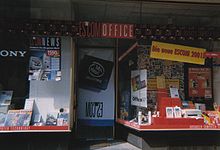Escom
Escom ( original spelling ESCOM; previously Schmitt Computersysteme GmbH ) was a company that dealt with the trade and manufacture of computers and computer accessories.
Foundation and advancement
Manfred Schmitt from Darmstadt had started offering computers in his Orgel-Schmitt music store chain in 1983 . In 1991 "Schmitt Computersysteme GmbH" was renamed "Escom Computer GmbH". The name Escom is composed of the names of the two founders Karl-Michael E ickmeyer and Manfred S chmitt and COM for Com puter together.
In 1993 Escom AG ( Heppenheim ) took over the insolvent, but listed HAKO Foto AG from Bochum . With the subsequent renaming of HAKO Foto AG, Escom AG was then listed on the stock exchange. Her business grew so quickly that by 1994 she already dominated 11.2% of the German PC market. The turnover was 2.35 billion Deutschmarks . Escom owned several hundred stores in ten European countries. Escom had made it to Germany's second largest PC seller after Vobis . Escom also manufactured in Heppenheim itself - in the sense that prefabricated components such as motherboards , housings , hard drives , etc. were assembled (“assembler” or “screwdriver”).
Escom shareholders included the Quelle mail order company (25%), which was still family-owned at the time , the PC manufacturer and chip supplier Siemens-Nixdorf (12.5%), the Bayerische Vereinsbank (16%) and Gold-Zack Werke AG (7%). The rest of the shares were in free float and in the hands of the founder.
Decline
Escom acted in the PC market as an aggressive low-price provider with chronically low margins and therefore high risk. The decisive slump happened during the Christmas business in 1995, when large quantities of Intel Pentium processors with 60 MHz were bought as a seemingly bargain and they were in stock for Christmas. Since the competition was only able to offer PCs with a clock frequency of 90 MHz at only slightly higher prices, Escom was left with the stocks, which turned out to be fatal. Despite these wrong purchasing decisions, the German Escom sales company was still in relatively good shape for the 1995 Christmas business.
It was wrong strategic decisions that finally led to its downfall. Participation in a joint venture for monitors with a Korean monitor manufacturer with a manufacturing facility in Ireland, who produced monitors with a very high error rate, was problematic . In the ambition of expansion across Europe, the acquisition of an English and a Dutch computer distribution chain led to losses. The stocks of these chains - especially those of the English - were extraordinarily high in relation to sales and caused corresponding losses. Those losses combined meant the end of Escom.
In the 1995 financial year, Escom's balance sheets showed losses of DM 185 million. The main shareholders did nothing to save it. The following spring, it had to file for bankruptcy.
Connection to Commodore and Amiga
In the spring of 1995 Escom bought the rights to Amiga from the bankruptcy estate of Commodore and announced that they wanted to rebuild the C64 and the Amiga computer. The Amiga models A4000T and A1200 were actually reissued and sold with a certain degree of success by the newly founded subsidiary Amiga Technologies GmbH ( Bensheim ). The first new development, the Amiga Walker, was shown to the public for the first time at Cebit 1996, but never went into series production - because Escom was dissolved beforehand.
The set-top box manufacturer VisCorp from Chicago (USA) made the first headlines in April 1996 when it was planning to take over the then Escom subsidiary Amiga Technologies GmbH (Bensheim).
Apparently VisCorp and Escom were already partners and already knew each other from the time when Bill Buck and Escom founder Manfred Schmitt attended the Commodore creditors' event in 1995, where the Amiga rights were auctioned for the first time. After the sale of the rights in April 1995, VisCorp started negotiations on an Amiga license agreement with the victorious bidder - i. H. the new Amiga parent company Escom - to be able to use the technology for the production of set-top boxes. They also received these licenses in January 1996.
After that, Escom's bankruptcy slowly emerged and sales negotiations began - the takeover plans were publicly announced on April 11, 1996. Allegedly Bill Buck and his wife Raquel Velasco paid the salaries, taxes and social security contributions of the Amiga staff from June to November 1996 out of their own pockets. Escom itself filed for settlement on July 3, 1996 and on July 15, 1996, the bankruptcy filing had to be filed.
Escom was then taken over by the Comtech Computersysteme store chain and initially continued as Escom 2001 GmbH. Amiga was not sold to VisCorp, but to the PC dispatcher Gateway 2000 .
Web links
- http://www.schoene-aktien.de/escom_alte_aktien.html ESCOM - rise and fall of a computer giant
- amigahistory.co.uk (engl.)
Individual evidence
- ↑ Escom-Computer founds monitor factory in Prestwick, Scotland . In: VDI-Nachrichten . No. 26 . VDI-Verlag, Düsseldorf June 26, 1992, p. 25 .
- ↑ Little hope for ESCOM . In: c't magazine for computer technology . Retrieved March 23, 2014.

